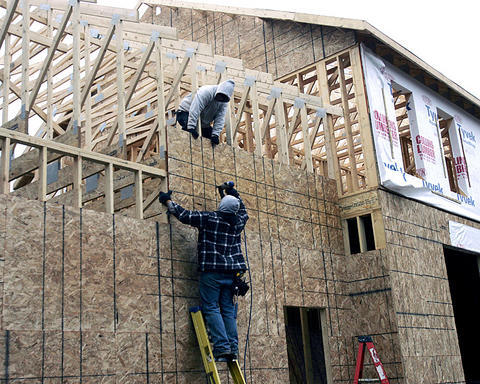US home prices marked a quarterly decline for the first time in 13 years in the third quarter, according to government data released on Thursday that provide fresh evidence of the housing market slump.
Home prices dipped 0.4 percent nationwide in the July-September period, compared with the previous quarter, the Office of Federal Housing Enterprise Oversight (OFHEO) said.
Compared with the third quarter of last year, US home prices posted an increase of 1.8 percent, but it was the smallest year-on-year increase since 1995, according to the agency, which oversees the big mortgage-finance companies Fannie Mae and Freddie Mac.

PHOTO: AP
"While select markets still maintain robust rates of appreciation, our newest data show price weakening in a very significant portion of the country," agency director James Lockhart said in a statement.
Prices declined in 21 states, OFHEO said.
The first quarterly decline since 1994 in the agency's House Price Index, based on data from home sales and refinancings, did not surprise David Resler, chief economist at Nomura Securities in New York.
"Our assumption is that a declining trend will now set in" that will mirror declines in other indices of home prices, he said. "We're getting into an environment where you can almost have a paralytic kind of situation. The question is whether sellers are lowering their asking price enough to move the property."
Also on Thursday, the Commerce Department said the median sales price of a new home fell 13 percent in October compared with a year ago to US$217,800. It was the biggest annual decline since September 1970 in the median price, the point at which half of homes sell for more and half for less.
A mortgage research firm, meanwhile, said US foreclosure filings nearly doubled next month from the same month last year. A total of 224,451 foreclosure filings were reported in October, Irvine, California-based RealtyTrac Inc said on Thursday.
According to OFHEO's data, many of the cities and states experiencing the sharpest declines in the quarter were the same areas that had posted the largest increases a couple of years ago during the housing boom.
Price declines were steepest in California (down 3.6 percent), Massachusetts (2.3 percent), Michigan (3.7 percent), Nevada (2.4 percent) and Rhode Island (2.2 percent).
"Rising inventories of for-sale properties are clearly having a material impact on home prices," said Patrick Lawler, the agency's chief economist.
Other measurements of home prices have been falling for some time while OFHEO's index, until now, had continued to rise. The reason, economists say, lies in differences in how home prices are calculated.
The widely tracked Standard & Poor's/Case-Shiller nationwide housing index, which fell 4.5 percent in the third quarter from last year, focuses on major metropolitan areas and includes expensive properties as well as cheaper ones.
The federal government index, while more national in its scope, excludes higher-priced homes and ones financed by riskier mortgages.

Japanese Prime Minister Sanae Takaichi yesterday lavished US President Donald Trump with praise and vows of a “golden age” of ties on his visit to Tokyo, before inking a deal with Washington aimed at securing critical minerals. Takaichi — Japan’s first female prime minister — pulled out all the stops for Trump in her opening test on the international stage and even announced that she would nominate him for a Nobel Peace Prize, the White House said. Trump has become increasingly focused on the Nobel since his return to power in January and claims to have ended several conflicts around the world,

UKRAINE, NVIDIA: The US leader said the subject of Russia’s war had come up ‘very strongly,’ while Jenson Huang was hoping that the conversation was good Chinese President Xi Jinping (習近平) and US President Donald Trump had differing takes following their meeting in Busan, South Korea, yesterday. Xi said that the two sides should complete follow-up work as soon as possible to deliver tangible results that would provide “peace of mind” to China, the US and the rest of the world, while Trump hailed the “great success” of the talks. The two discussed trade, including a deal to reduce tariffs slapped on China for its role in the fentanyl trade, as well as cooperation in ending the war in Ukraine, among other issues, but they did not mention

REASSURANCE: The US said Taiwan’s interests would not be harmed during the talk and that it remains steadfast in its support for the nation, the foreign minister said US President Donald Trump on Friday said he would bring up Taiwan with Chinese President Xi Jinping (習近平) during a meeting on the sidelines of the APEC Summit in South Korea this week. “I will be talking about Taiwan [with Xi],” Trump told reporters before he departed for his trip to Asia, adding that he had “a lot of respect for Taiwan.” “We have a lot to talk about with President Xi, and he has a lot to talk about with us. I think we’ll have a good meeting,” Trump said. Taiwan has long been a contentious issue between the US and China.

GLOBAL PROJECT: Underseas cables ‘are the nervous system of democratic connectivity,’ which is under stress, Member of the European Parliament Rihards Kols said The government yesterday launched an initiative to promote global cooperation on improved security of undersea cables, following reported disruptions of such cables near Taiwan and around the world. The Management Initiative on International Undersea Cables aims to “bring together stakeholders, align standards, promote best practices and turn shared concerns into beneficial cooperation,” Minister of Foreign Affairs Lin Chia-lung (林佳龍) said at a seminar in Taipei. The project would be known as “RISK,” an acronym for risk mitigation, information sharing, systemic reform and knowledge building, he said at the seminar, titled “Taiwan-Europe Subsea Cable Security Cooperation Forum.” Taiwan sits at a vital junction on